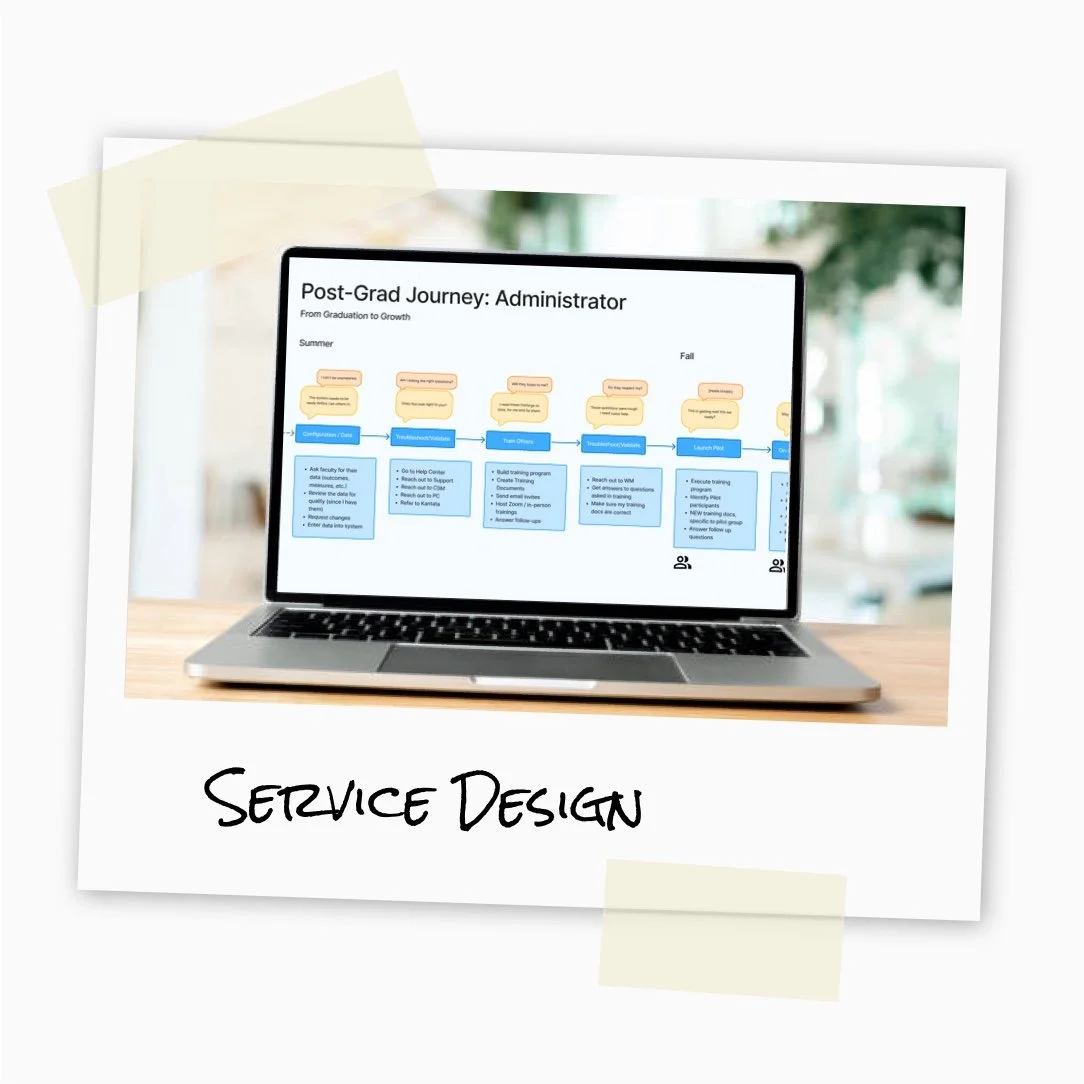Service Design
Problem
Customers aren’t equipped to scale product usage across campus.
Why this matters
Low adoption and usage leads to low client retention.
What I did
Redesigned service delivery methods by leading cross-functional discovery and design activities with Product and Customer Experience teams.
How this helped
Decreased clients’ time to value and increased retention.
CX Design Sprint Board
Overview
Watermark Insights, a SaaS company helping higher education institutions with their accreditation processes, was experiencing a decline in retention and adoption for one of its products.
Research into the problem showed we had scaling issues after clients had been implemented.
Goals
Map the full customer journey, spot key gaps and opportunities, and use insights to create smoother, more valuable experiences.
Improve internal collaboration among Sales, Implementation, Client Success, and Product teams to enhance customer experience and operational efficiency.
Roles & Responsibilities
Service Designer & Lead Researcher
I led an 8-week discovery process and facilitated stakeholder alignment through kickoff meetings with CX Leaders and Subject Matter Experts (SMEs) from Marketing, Sales, Client Success, Services, and Support. My research responsibilities included conducting qualitative interviews with both internal stakeholders and external clients, reviewing existing documentation, analyzing usage metrics, and synthesizing the data into actions.
I spearheaded a mini Design Sprint with CX and Product team members to gain alignment on the problems that exist and explore possible solutions.
Users & Audience
The project engaged a diverse group of stakeholders, including both internal partners and external clients:
Internal stakeholders included Client Success, Services, and Support Managers, highlighting an emphasis on improving work life for partners by understanding their challenges in supporting clients.
External clients represented various roles and experiences across the customer lifecycle. This approach provided a holistic view of the end-to-end experience.
Process
Stakeholder Alignment
Initiated the project with kickoff meetings involving CX Leaders and internal Subject Matter Experts from various departments to ensure alignment and gather initial perspectives.
Research & Data Collection:
Conducted 1-hour qualitative interviews with both internal partners (e.g., Client Success, Services, Support Managers) and external clients to capture their experiences, pain points, and moments of success across the lifecycle.
Audited existing documentation, client resources, and internal notes.
Analyzed available usage metrics to understand conversion rates and time-to-value.
Synthesis & Insights
Organized collected data to highlight emotional and functional needs, identifying perception-vs-reality gaps in expectations. This involved drafting initial customer journey maps and stakeholder maps.
The heart of the problem:
Misaligned sales promises vs. product reality causing frustration.
Complex onboarding and long time-to-value hurting retention.
Rigid implementation ignoring diverse client needs, causing delays.
Poor internal communication, especially sales to service handoffs.
Insufficient post-implementation support and training.
Deliverables
The primary deliverables included a detailed Service Blueprint and a Customer Journey Map from the client's perspective, supplemented by Stakeholder Maps and Experience Gap Assessments. These insights are crucial for informing product development and redesigning implementation processes to be more flexible and customized.
Key Impacts & Next Steps:
Strategic Influence: The findings are meant to drive strategic decisions, inform product roadmaps, and enhance internal communication all to positively effect the client experience at Watermark.
Process Improvement: Recommendations included exploring more flexible implementation approaches, potentially leveraging AI for data pre-population, and developing proactive support strategies to guide clients post-implementation.
Continuous Improvement: The next steps involve finalizing deliverables, sharing findings with product and cross-functional teams to initiate solutioning, and piloting new approaches to measure their impact on client success metrics.

